Rooted In Resilience: Localized Food Systems Thrive In Southwest Colorado
In the fertile valleys and high mesas of Western Colorado, a quiet revolution is taking root. Farmers, nonprofits and community leaders are weaving together a resilient food system — one that nourishes both people and the land. By embracing regenerative agriculture and fostering direct connections between growers and consumers, these local food systems are cultivating more than just crops; they’re cultivating community resilience and environmental stewardship.
Photo courtesy of Penelope Powell/Valley Food Partnership
“Our region is incredibly prolific when it comes to fresh, local foods,” says Penelope Powell of Valley Food Partnership, based in Montrose. “From cherries and peaches to wine grapes and beer hops, from sweet corn to eggs and kale — we’re rich in both bounty and heritage.”
That abundance is more than seasonal; it’s cultural. Farmers markets, CSAs, food hubs and educational initiatives have turned Southwest Colorado into a microcosm of what’s possible when food is grown, shared and celebrated close to home. Valley Food Partnership has been a cornerstone in this movement, working to connect local agriculture with local people through education, technical support and community building.
“A localized food system is vital to the economic health of small, family-owned farms and ranches, the stewardship of our natural resources and the physical well-being of the communities it serves,” Powell says.
Their programs — like Cultivating Farmers and Ranchers that Thrive, developed in partnership with Holistic Management International — emphasize values-based decision making and regenerative principles: healthy soil, crop diversity and integrated livestock systems. Through tools like Sprout, their no-till seed drill, they’re helping producers increase organic matter, improve water retention and reduce erosion — practices that quite literally build resilience from the ground up.
Each year, Valley Food Partnership also hosts the Western Colorado Soil Health, Food and Farm Forum, drawing farmers, scientists and policymakers into the same room to dig into the future of agriculture.
Photo courtesy of David Demerling/Hearty Provisions
But the movement isn’t just happening in fields. In kitchens, coolers and delivery trucks across the Western Slope, businesses like Hearty Provisions are forging a bridge between regenerative producers and the restaurants, retailers and institutions hungry for real change.
“Regenerative agriculture is core to everything we do,” says David Demerling, founder of Hearty Provisions. “Every product we source is an opportunity to support land stewardship and long-term sustainability.”
Based in Durango, Hearty Provisions works with regional producers to supply clean, traceable ingredients to businesses that value more than just taste. It’s a mission rooted in transparency — and a belief that every food dollar spent locally is a seed of change.
“At Hearty, we’re connectors,” Demerling says. “We help small farms grow by providing access to consistent buyers. Socially, we strengthen community ties through food. Environmentally, we promote practices that restore rather than deplete. Economically, we keep more value circulating locally.”
In this system, food is never “just food.” As Demerling reminds us, “Behind every ingredient is a farmer’s hands, a harvest timeline, a soil story. The more we understand that, the more intentional we become — not just in how we eat, but in how we care for each other and the planet.”
And intention is key. The COVID-19 pandemic laid bare the fragility of long, complex supply chains, sparking renewed interest in shorter, stronger and more transparent food networks. For Powell, the shift underscores the necessity of relationship-centered systems.
Photo courtesy of Penelope Powell/Valley Food Partnership
“We believe that building a resilient regional food system starts with building community,” she says. “When people know their landscape, their neighbors and where their food comes from, it fosters a deep sense of place and belonging.”
That sense of connection — between people and the land, between eaters and growers — is the heart of Southwest Colorado’s localized food movement. And it’s not just good for the planet. It’s delicious.
“It actually tastes better!” Powell laughs. “Local food is harvested at peak ripeness, which means it’s not only more nutrient-dense, but also more flavorful. Fresh, in-season food just hits different.”
From soil to supper, these food systems are more than trends — they’re testaments to what’s possible when a region turns toward its roots. With every bite, every handshake and every seed planted, Southwest Colorado is proving that a resilient food future is already here — and growing.
As novelist and environmental activist Wendell Berry so aptly put it, “Eating is an agricultural act.” In Southwest Colorado, it’s also an act of community, care and connection.
For more information on joining the AgriWest council, email inquiries to frontdesk@gjincubator.org.
Originally published in the summer 2025 issue of Spoke+Blossom.



